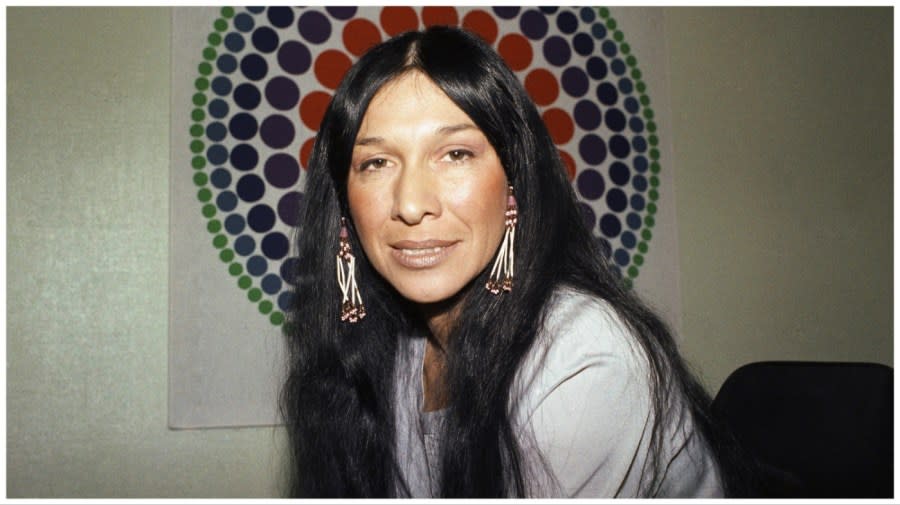What to know about the fake identity claims surrounding Canadian singer Buffy Sainte-Marie

- Oops!Something went wrong.Please try again later.
- Oops!Something went wrong.Please try again later.
Oscar-winning folk singer Buffy Sainte-Marie is among Canada’s most celebrated Indigenous icons. Her 60-year-long career coincided with singers such as Bob Dylan and Joni Mitchell and earned her Canada’s highest civilian honor.
However, the 82-year-old’s Indigenous origins have come under scrutiny after an extensive Canadian Broadcasting Corporation (CBC) investigation exposed a series of apparent fabrications about her life and identity.
The CBC’s investigation into Sainte-Marie was published and aired late last month, revealing a string of puzzling contradictions and questions about her family and ethnicity. Here’s what to know about the controversy:
Claims of adoption appear untrue
Sainte-Marie has long claimed she was born on the Piapot First Nation reserve in Saskatchewan, Canada, and then adopted as a baby by a white American couple, who raised her near Boston.
“I was told that I was adopted. I was told that I was just born ‘on the wrong side of the blanket.’ In other words, one of my parents was my parent and one wasn’t. I was told that we were part-Indian, but nobody knew anything about it,” she is quoted as saying in her 2018 biography.
However, CBC News tracked down her birth certificate, stating that Sainte-Marie was born Beverly Jean Santamaria at a hospital in Stoneham, Mass., on Feb. 20, 1941, to Albert and Winifred Santamaria, who were of Italian and English ancestry.
She had claimed the couple adopted her during the “the Sixties Scoop”, a period between the 1950s and 1980s during which thousands of Indigenous children were put up for adoption. However, the program started years after her birth.
CBC News reported that Sainte-Marie told an interviewer in 2017 that she had been unable to locate her birth certificate because “six years of birth records were destroyed at the hospital that would have been servicing Piapot Reserve” at the time of her birth in 1941.
Saskatchewan’s Ministry of Social Services told the outlet that birth records of individuals adopted as children at that time are easily accessible.
Sainte-Marie’s family maintains that she is Caucasian
Multiple relatives of Sainte-Marie have publicly stated that the singer is white, including her older brother Alan Sainte-Marie as well his daughter, Heidi Sainte-Marie.
CBC News reported that Alan Sainte-Marie composed several letters to newspapers during the early 1970s that seemed to counter claims that his sister was Indigenous.
“Buffy St. Marie was not born on a reservation…. She was born of Caucasian parents in Stoneham, Mass.,” he wrote to the Denver Post in May 1972. “To associate her with the Indian and to accept her as his spokesman is wrong.”
Heidi Sainte-Marie told CBC News that her father had received letters from his sister and her high-powered Los Angeles attorney that threatened to take legal action should the family continue to publicly challenge the singer’s ancestry.
Buffy Sainte-Marie said that in her 20s, she was adopted by a Cree couple who regarded her as “their own.”
Her lawyer told CBS she “is entitled to a reasonable expectation of privacy about her personal genealogical and family history.”
Descendants of her adoptive Cree family told the outlet, “we chose her and she chose us,” adding “Canada does not get to determine who we claim as family, and neither does the media.”
Latest notable person accused of lying about identity
Sainte-Marie is the latest notable figure whose racial and ethnic identity has been called into question or revealed to be made up.
In 2015, Rachel Dolezal, then president of the NAACP chapter in Spokane, Wash., made headlines after her parents publicly said that she was pretending to be Black but was in fact born white. A documentary on her life, “The Rachel Divide,” was later released on Netflix.
Following her death in October 2022, actress and Native American civil rights activist Maria Louise Cruz, better known as Sacheen Littlefeather, was accused by her sisters of lying about her Indigenous ancestry.
And in March, a watchdog group called Tribal Alliance Against Frauds alleged that indie film producer Heather Rae was a “pretendian,” who for years had been falsely posing as Indigenous.
Rae told The Hollywood Reporter, responding to the allegations, that she had only recently started “to really look into my family’s history in a deeper way,” adding, “so for several years I have identified as an ally.”
For the latest news, weather, sports, and streaming video, head to The Hill.

